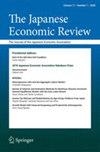虚假销售:动态定价视角
IF 0.5
4区 经济学
Q2 ECONOMICS
引用次数: 0
摘要
一些卖家在“正常”价格上显示出很高的价格,但在大多数情况下,他们会把这些价格标为“打折”或“打折”。本文提出了一个理解这一做法的框架,强调了买方对商品未来估值的不确定性所起的作用。我们认为,所谓的“常规”价格设定了买家对未来价格的预期,这种预期不必与实际设定的价格挂钩。通过抬高买家对未来价格的预期,卖家可以在当前的“销售”价格上增加对商品的需求,从而增加利润。本文章由计算机程序翻译,如有差异,请以英文原文为准。
Fake Sales: A Dynamic Pricing Perspective
Some sellers display high “regular” prices, but mark down these prices the vast majority of the time, advertising the good as “on sale” or “discounted”. This note suggests a framework for understanding the practice, emphasising the role of buyer uncertainty about their future valuations for the good. We argue that so-called “regular” prices set buyers’ expectations regarding future prices, expectations that need not be tethered to the prices actually set. By manipulating upwards buyers’ expectations of future prices, the seller can increase demand for the good at the current “sale” price, increasing profits.
求助全文
通过发布文献求助,成功后即可免费获取论文全文。
去求助
来源期刊

Japanese Economic Review
ECONOMICS-
CiteScore
2.70
自引率
0.00%
发文量
15
期刊介绍:
Started in 1950 by a group of leading Japanese economists under the title The Economic Studies Quarterly, the journal became the official publication of the Japanese Economic Association in 1959. As its successor, The Japanese Economic Review has become the Japanese counterpart of The American Economic Review, publishing substantial economic analysis of the highest quality across the whole field of economics from researchers both within and outside Japan. It also welcomes innovative and thought-provoking contributions with strong relevance to real economic issues, whether political, theoretical or policy-oriented.
 求助内容:
求助内容: 应助结果提醒方式:
应助结果提醒方式:


